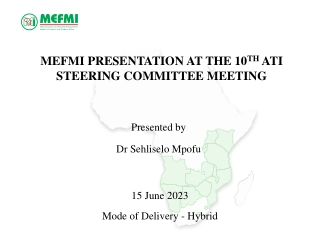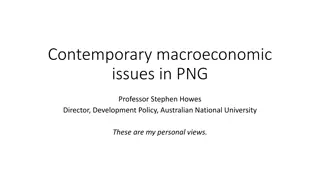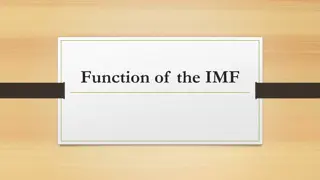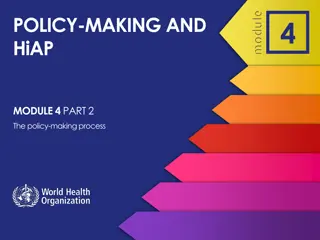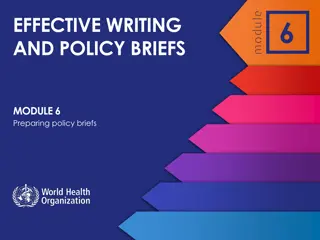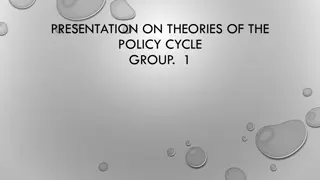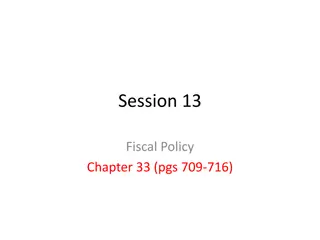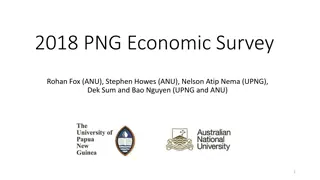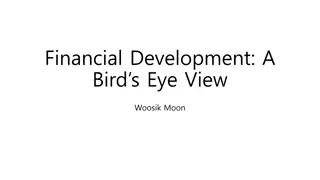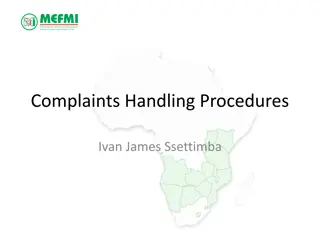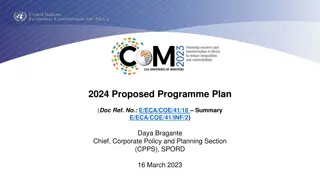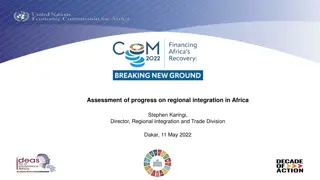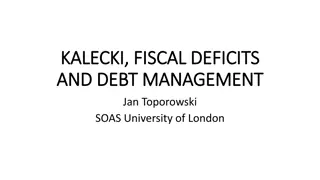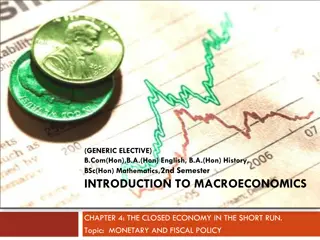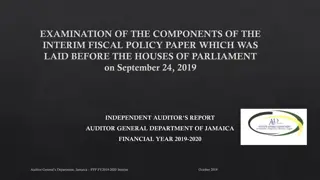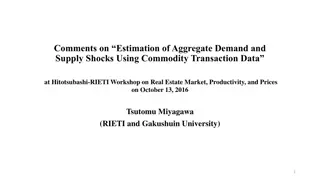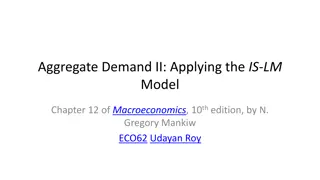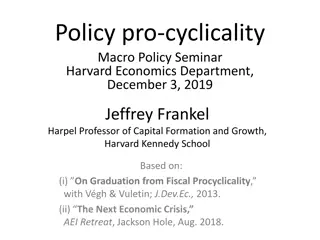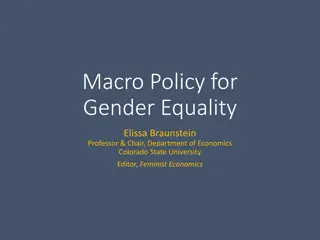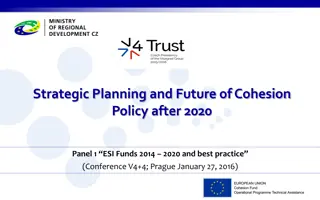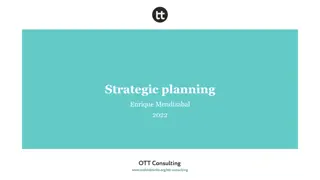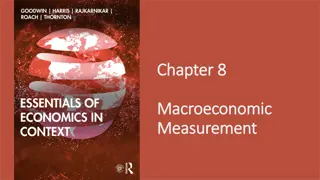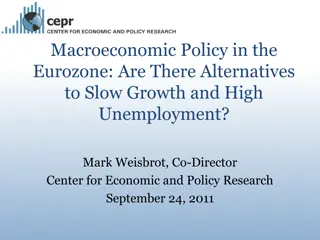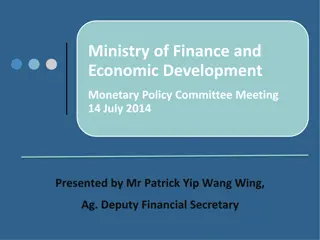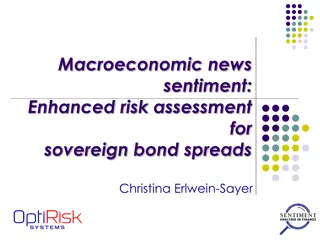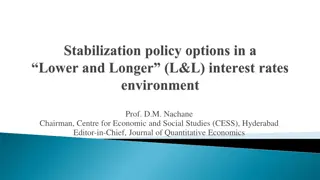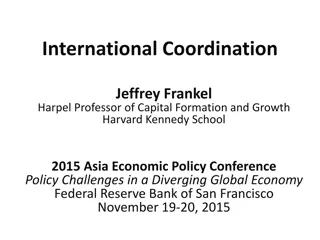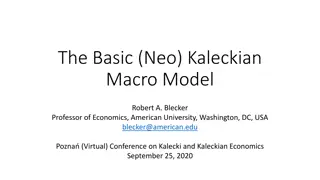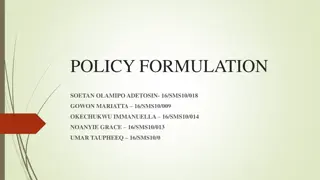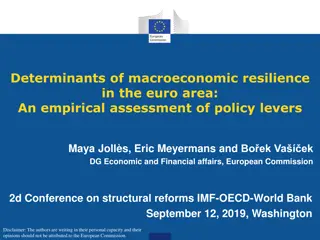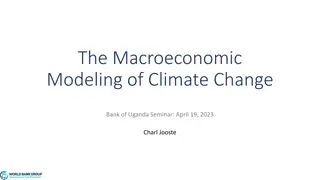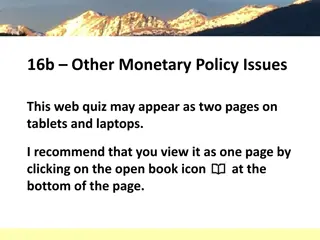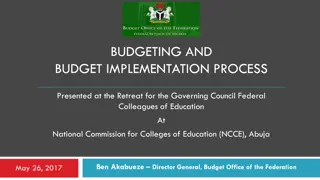MEFMI Presentation on Collaboration and Capacity Development with ATI and IMF
The Macroeconomic and Financial Management Institute of Eastern and Southern Africa (MEFMI) presented on their collaboration with the African Training Institute (ATI) and the International Monetary Fund (IMF) at the 10th ATI Steering Committee meeting. The collaboration includes joint regional cours
1 views • 7 slides
Importance of Financial Reporting as a Catalyst for Growth
Financial reporting frameworks such as International Financial Reporting Standards (IFRS), Generally Accepted Accounting Principles (GAAP), and the role of financial statements play a crucial role in enhancing trust in financial information, reducing information asymmetry, promoting investment, faci
2 views • 90 slides
Analysis of Contemporary Macroeconomic Issues in Papua New Guinea
Professor Stephen Howes, Director of Development Policy at Australian National University, presents his personal views on macroeconomic issues in Papua New Guinea. The focus is on the exchange rate regime and its management, excess liquidity, and fiscal policy. Various economic indicators point to c
1 views • 48 slides
The Functions of the IMF: Regulatory, Financial, Consultative
The International Monetary Fund (IMF) has several functions, including regulatory oversight, financial support for member countries facing balance of payments deficits, and providing consultative guidance. These functions are crucial in ensuring stability in the international monetary system. The IM
1 views • 6 slides
Policy-Making Process for Health Improvement
Policy-making involves defining policy, recognizing its complex nature, identifying windows of opportunity, and framing health issues. The policy-making cycle includes stages like agenda setting, formulation, and implementation. Alignment of problems, policies, and politics is crucial for effective
1 views • 12 slides
Effective Writing and Policy Briefs: Enhancing Impact in Policy-making
A policy brief is a compelling document designed to influence decision-makers by outlining policy alternatives and courses of action. Discover the value of policy briefs, effective characteristics, and strategies for agenda setting and policy formulation in this comprehensive module.
1 views • 22 slides
Theories of the Policy Cycle in Policy Analysis
The policy cycle theory describes the evolution of policy issues from inception to evaluation, impacting scientific research and policy formulation. It outlines stages from the 1950s, influenced by Lasswell's seven-stage model, serving as a framework for organizing policy processes. Despite the line
3 views • 30 slides
Fiscal Policy: A Comprehensive Overview
Fiscal policy involves changes in government spending and taxes to influence macroeconomic objectives like employment, price stability, and economic growth. It includes expansionary and contractionary policies to manage aggregate demand and stabilize the economy. This overview covers types of fiscal
0 views • 24 slides
2018 PNG Economic Survey: Analysis and Recommendations
The 2018 PNG Economic Survey conducted by a team of experts highlights the challenges faced by the non-resource economy in Papua New Guinea. The report emphasizes the need for policy actions to stimulate growth, address foreign exchange shortages, and boost employment. Data indicates a recession in
1 views • 44 slides
Economic and Monetary Policies in Korea and Worldwide
This course provides an insightful exploration of major policy issues related to money, banking, and financial development globally and in Korea. It covers the goals and conduct of economic and monetary policies, the impact of money on economies, financial stability, and responses to depression and
2 views • 25 slides
Complaints Handling Procedures at Macroeconomic and Financial Management Institute
Effective complaints handling is essential for feedback and improvement in financial services. Learn about the benefits, principles, and responsibilities involved in managing complaints at the Macroeconomic and Financial Management Institute of Eastern and Southern Africa.
0 views • 21 slides
Strategic Programme Plan for 2024 Focused on Economic Development and Sustainability
The proposed programme plan for 2024 outlines strategic tracks including strengthening macroeconomic policy, enhancing resilience through climate action, and boosting the implementation of key initiatives. It aims to support private sector development, regional integration, data and statistics, and
2 views • 8 slides
Assessment of Progress on Regional Integration in Africa: Key Messages and Recommendations
Regional integration in Africa remains vital for economic transformation, with progress and challenges highlighted in a technical report. The African Continental Free Trade Area (AfCFTA) is a significant milestone for boosting trade and market integration on the continent. Efforts are needed to addr
0 views • 5 slides
Principles of Fiscal Deficits and Debt Management According to Kalecki
Economist Kalecki advocated for a permanent regime of fiscal deficits to manage public debt, emphasizing the importance of debt management for liquidity in the financial system. His principles involve splitting the government budget into functional and financial parts, each influencing aggregate dem
0 views • 6 slides
Macroeconomic Policy Tools: Monetary and Fiscal Policy in Short Run
This chapter delves into the IS-LM model to illustrate the functioning of monetary and fiscal policies in influencing economic growth. It explains how these policies impact output, interest rates, and inflation rates in a closed economy in the short run. Monetary policy mainly operates through open
0 views • 18 slides
Examination of Interim Fiscal Policy Paper for Financial Year 2019-2020
An independent auditor's report on the interim fiscal policy paper laid before the Houses of Parliament, confirming compliance with the requirements of the FAA Act. The report assesses the components, conventions, and assumptions underlying the paper for fiscal responsibility, macroeconomic framewor
2 views • 15 slides
Challenges in Policy Implementation and Lessons Learned
The content discusses the challenges faced in policy implementation, focusing on the gap between policy design and execution. It highlights key steps in policy-making, reasons for implementation failures, and factors influencing successful policy outcomes. Examples from Zambia's National Science and
1 views • 14 slides
The Future of the European Semester: Economic Policy Coordination in the EU
The European Semester is a framework for coordinating economic policies in the EU, focusing on fiscal sustainability, macroeconomic imbalances, structural reforms, and investments. The cycle involves key steps at both the EU and national levels, with pros and cons identified in its implementation. T
0 views • 7 slides
Estimation of Aggregate Demand and Supply Shocks Using Commodity Transaction Data
This study presented at Hitotsubashi-RIETI Workshop analyzes demand and supply shocks using commodity transaction data. By estimating elasticity parameters and examining movements in price and quantity, the research identifies negative supply shocks post-global financial crisis and after 2013. The p
0 views • 8 slides
The IS-LM Model for Macroeconomic Analysis
The IS-LM model, discussed in Chapter 12 of Macroeconomics, helps analyze how an economy responds to policy changes and shocks in the short run. By understanding the IS and LM curves and their intersection, we can evaluate short-run macroeconomic outcomes for real interest rates (r) and real output
0 views • 103 slides
Policy Pro-cyclicality in Macroeconomic Theory
Delve into the concept of policy pro-cyclicality in macroeconomic theory through the insights shared by Jeffrey Frankel at a seminar at Harvard Economics Department. Explore examples of pro-cyclicality in developing countries, euro periphery countries, and US political scenarios, along with discussi
0 views • 42 slides
Gender Inequality and Macroeconomic Policy
Exploring the differential impacts of macroeconomic structures and policies on gender equality, this analysis delves into issues such as gender-biased access to resources, labor-intensive export orientation, and the effects of inflation targeting. It highlights how women, especially in marginalized
0 views • 14 slides
Past, Present, and Future of Cohesion Policy in the Czech Republic
The impact and evolution of Cohesion Policy in the Czech Republic are highlighted through the analysis of ESI Funds, macroeconomic values, and effects on EU-15 countries. The transition from basic infrastructure investments to value-added initiatives and the role of EU funds in entrepreneurship, inn
0 views • 20 slides
Theories and Strategies for Effective Policy Change
Explore the intricacies of strategic planning, outcome mapping, change theories, policy windows, and more in the realm of policy entrepreneurship and advocacy. Learn about key concepts such as large leaps theory, policy streams theory, and how think tanks can influence policy decision-making process
0 views • 43 slides
Macroeconomic Policy for Development and Decent Work in South Africa
This research agenda delves into the core conclusions, policy context, and objectives of macroeconomic policy for facilitating development and decent work in South Africa. Key points include the need for structural transformation, challenges in job creation, and the link between macroeconomics, empl
0 views • 44 slides
Macroeconomic Measurement: GDP, Unemployment, and Labor Force Analysis
This content explores various aspects of macroeconomic measurement, including GDP calculation, real vs. nominal GDP, GDP deflator vs. CPI, and unemployment rates for different groups. It provides tables and figures to illustrate these concepts and data sources from reputable organizations like the U
0 views • 13 slides
Macroeconomic Policy in the Eurozone: Challenges and Alternatives
The macroeconomic policies in the Eurozone led by the Troika (ECB, European Commission, IMF) have been criticized for contributing to slow growth and high unemployment. This analysis by Mark Weisbrot delves into the negative impact of fiscal, monetary, and exchange rate policies on troubled economie
0 views • 32 slides
Update on Ministry of Finance and Economic Development Monetary Policy Committee Meeting
The Ministry of Finance and Economic Development Monetary Policy Committee Meeting held on July 14, 2014, highlighted key policy announcements including public sector reforms, business facilitation improvements, and coordination of macroeconomic policies. The focus on transitioning to a High Income
0 views • 18 slides
Morality in UK Drug Policy: Policy Constellations Analysis
Morality plays a significant role in shaping drug policy in the UK, as revealed by the research conducted by Professor Alex Stevens at the University of Kent. The study investigates the moral commitments underlying different policy positions in UK drug policy debates, highlighting five ethico-politi
0 views • 19 slides
Industrial Policy: The Old and The New - Insights by Dani Rodrik
Industrial policy, as presented by Dani Rodrik in May 2019, emphasizes the importance of empirical work, the differences between old and new policies, and the targets industrial policy should focus on. The theoretical arguments for industrial policy highlight market imperfections, learning spillover
0 views • 26 slides
Enhancing Risk Assessment for Sovereign Bond Spreads with Macroeconomic News Sentiment
Eurostars project SENRISK aims to develop an automated credit risk assessment tool for fixed income products by incorporating news sentiments. This innovative Decision Support System enhances predictive risk models using sentiments from macroeconomic news and social media. The project focuses on val
0 views • 24 slides
Challenges and Alternatives in Monetary Policy During Economic Depressions
The zero lower bound (ZLB) poses challenges to conventional monetary policy during severe depressions, leading to prolonged periods of low interest rates. Mainstream macroeconomic theory falls short in providing effective guidance, prompting the exploration of alternate mechanisms such as taxation,
0 views • 29 slides
The Return of International Policy Coordination: Challenges and Opportunities
Calls for international macroeconomic policy coordination are resurfacing after a 30-year hiatus, with discussions on the evolution of coordination, reasons for its decline, and the revived interest in G-20 summits. Scholars and policymakers are exploring various frameworks for coordinating fiscal a
0 views • 30 slides
Neo-Kaleckian Macro Model Overview
This presentation explores the Neo-Kaleckian macroeconomic models, examining their development, key elements, and unique features within the broader context of economic theories. It delves into the first-generation models by Harris and Asimakopulos, focusing on markup pricing, labor costs, profit sh
0 views • 22 slides
Policy Formulation: Key Concepts and Approaches
Policy formulation is a crucial step in the policy-making process, involving identifying and crafting policy alternatives to address various issues. This phase requires participants to define policy problems, develop alternatives, and select the most feasible solutions based on criteria such as feas
1 views • 12 slides
Assessing Macroeconomic Resilience in the Euro Area
This study assesses the determinants of macroeconomic resilience in the Euro area, emphasizing the importance of economic resilience to absorb shocks, promote convergence, and achieve short-term gains like lower unemployment and higher income. The framework includes components such as absorption, re
0 views • 18 slides
Macroeconomic Modeling of Climate Change in Policy Making
In this seminar by Charl Jooste at the Bank of Uganda, the discussion revolves around the essential ingredients for macro models to incorporate climate policy and climate change. The talk highlights the need to augment standard macroeconomic functions, react to price signals, and link macro models w
0 views • 48 slides
Monetary Policy: Mainstream vs. Monetarist Perspectives
Learn about the strengths and shortcomings of monetary policy, compare mainstream (Keynesian) and monetarist (Classical) views on macroeconomic instability, discuss self-correction in the economy, and explore the debate between rules and discretion in conducting stabilization policy. Key terms inclu
0 views • 52 slides
Budgeting and Budget Implementation Process in Government
This presentation delves into the concepts of budgeting and budget implementation in the context of government finance, focusing on fiscal policies, macroeconomic goals, and the budget framework. It explains how budgets reflect government priorities and strategies to achieve economic stability and g
0 views • 26 slides
Macroeconomic Policy Framework for Structural Transformation of African Economies
Structural transformation is essential for the development of African economies, involving shifts towards higher productive activities and inclusive growth. The process requires purposeful efforts to create articulated economies with coordinated economic activities and positive externalities. Emphas
0 views • 13 slides
